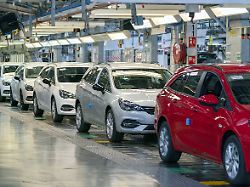“Also a danger for e-mobility”
Car makers are sounding the alarm over the Brexit trade deal
05/18/2023, 4:49 p.m
According to the German automotive industry, if the trade agreement concluded with the EU after Brexit is not renegotiated, there is a risk of a considerable competitive disadvantage. And not only that: Europe would also fall behind as a location for battery cell production.
The German car manufacturers are pushing for improvements to the joint trade and cooperation agreement (TCA) between the European Union and Great Britain. Otherwise, there would be a risk of “customs payments both when exporting e-cars to the United Kingdom and when exporting them out of the United Kingdom,” said a spokeswoman for the German Association of the Automotive Industry (VDA). This is not only a significant competitive disadvantage for the European automotive industry compared to its Asian competitors in the very important British market. It “also poses a threat to the ramp-up of e-mobility”, both in Great Britain and in the EU.
According to the trade deal agreed when Britain left the Union, 45 percent of the value of an electric vehicle must come from the UK or the EU from next year to avoid tariffs. These rules of origin should be quickly adapted to the real situation and developments in the development of European battery manufacturing capacities. “Therefore, the applicable rules of origin must be extended as a first step until the end of 2026,” said the VDA spokeswoman. However, it is already foreseeable that the necessary localization of active cathode material within the EU and the United Kingdom in particular will not be completed by the end of 2023.
The entire EU supply chain will be negatively affected if the rules of origin come into force unchanged in 2024. “Such a negative scenario for European competitiveness must be avoided, otherwise the EU would also fall behind as a location for battery cell production,” said the VDA spokeswoman. “This is how the transformation is slowed down.”
The carmaker Stellantis had previously raised the alarm with the British government: If the trade agreement is not renegotiated immediately, there is a risk of factories closing and the loss of thousands of jobs, the owner of the car brands Opel, Vauxhall, Peugeot, Citroën and Fiat said in front of a Committee of the House of Commons. Stellantis has asked the government in London to agree with the EU to extend the current rules for the procurement of car parts by three years until 2027.
